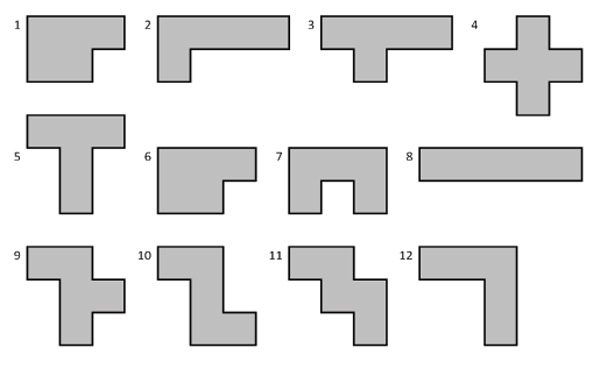Article
Bityutskaya E.V., Kavtaradze D.N. (2019). Simulation puzzle game as a model for solving the difficult life task. Moscow University Psychology Bulletin, 3, 3-26
Abstract
Relevance. In modern psychology, coping is understood as a multicomponent phenomenon. Research conducted using questionnaires allows you to study only one of the components. The proposed simulation puzzle game models the situation of solving group problems and opens up the possibility of observing and research poorly studied aspects, in particular, the ratio of individual and group coping, the dynamics of overcoming a difficult situation.
Objective. The goal is to test a simulation puzzle game as a tool for studying coping with a difficult situation, analyzing the possibilities of a technique for studying human activities to solve difficult life tasks.
Method. A group of 3 people are invited to collect on the proposed silhouette 3 identical figures of 12 elements of pentamino. In the course of the game, a protocol is kept and the video is recorded. At the end of the game is debriefing. The study involved 72 people.
Results. The analysis of signs of a difficult life task in comparison with conditions of game and results of supervision is carried out. A categorical apparatus for content analysis of replicas of participants elaborated.Selected indicators of the coping process: number of proposed solutions, content of replicas, ways of coping, role (individual indicators); time of collecting the puzzle, the emotional background, the implementation of successful initiatives, satisfaction of participants with the game (group indicators). The possibilities of debriefing to analyze the experience of problem solving are described.
Conclusions. Asimulation puzzle game allows you to study the processes of individual and group copying. Using the game model, conditions are created in which the experience of interaction with difficult life situations is reproduced.
Sections: Empirical studies;
Theoretical studies;
Received: 07/15/2019
Accepted: 07/24/2019
Pages: 3-26
DOI: 10.11621/vsp.2019.03.03
Keywords: difficult life situation; task; brain-twisters; goals; coping; simulation game; pentamino;
Available Online 29.08.2019

Pic. 1

Pic 2.
Table
|
Условия «Задачи для троих» |
Предмет психологического исследования |
Признаки трудной жизненной задачи, которые моделирует имитационная игра |
|
Возможности для игроков: а) наличие объективно успешных решений и действий, которые необходимо определить, понять, разгадать; |
Эффективность участников (и группы в целом) по обнаружению и реализации этих возможностей. |
Необходимость поиска и обнаружения в окружающей обстановке возможностей для решения жизненной задачи. Использование этих возможностей для разработки стратегии достижения цели. |
|
б) подсказка, собраны ли 2 фигуры таким образом, чтобы достичь одновременной сборки трех фигур. |
Интерпретационные схемы участников. |
|
|
Ограничения для игроков: дефицит составных деталей в игре трех участников. |
Стратегии разрешения конфликтных ситуаций, возникающих из-за необходимости борьбы, конкуренции. Действия лидера и менее активных участников. Преодоление помех, возникающих при реализации замысла, и устойчивость к ним. Преодоление негативных эмоций. |
Возможность активного решения или принятия пассивной роли в трудной ситуации. Необходимость преодоления возникающих помех, необходимость договариваться с другими участниками ситуации. |
|
Совместная деятельность трех участников по решению общей для них задачи.
|
Особенности восприятия, оценивания задачи и связанная с этим групповая динамика, сплоченность и др. |
Трудная жизненная ситуация разворачивается в социальном контексте, что предполагает необходимость взаимодействовать, отстаивать свои позиции, иногда реализовывать свои замыслы вопреки интересам других людей. |
|
Объективная трудность, сложность, неопределенность игровой задачи. |
Групповой копинг и другие процессы в малой группе. Индивидуальныестратегии взаимодействия и достижения цели каждым участником. |
Трудная жизненная задача содержит трудную цель, что часто сочетается со сложностью и неопределенностью ситуации. |
For citing this article:
Bityutskaya E.V., Kavtaradze D.N. (2019). Simulation puzzle game as a model for solving the difficult life task. Moscow University Psychology Bulletin, 3, 3-26








